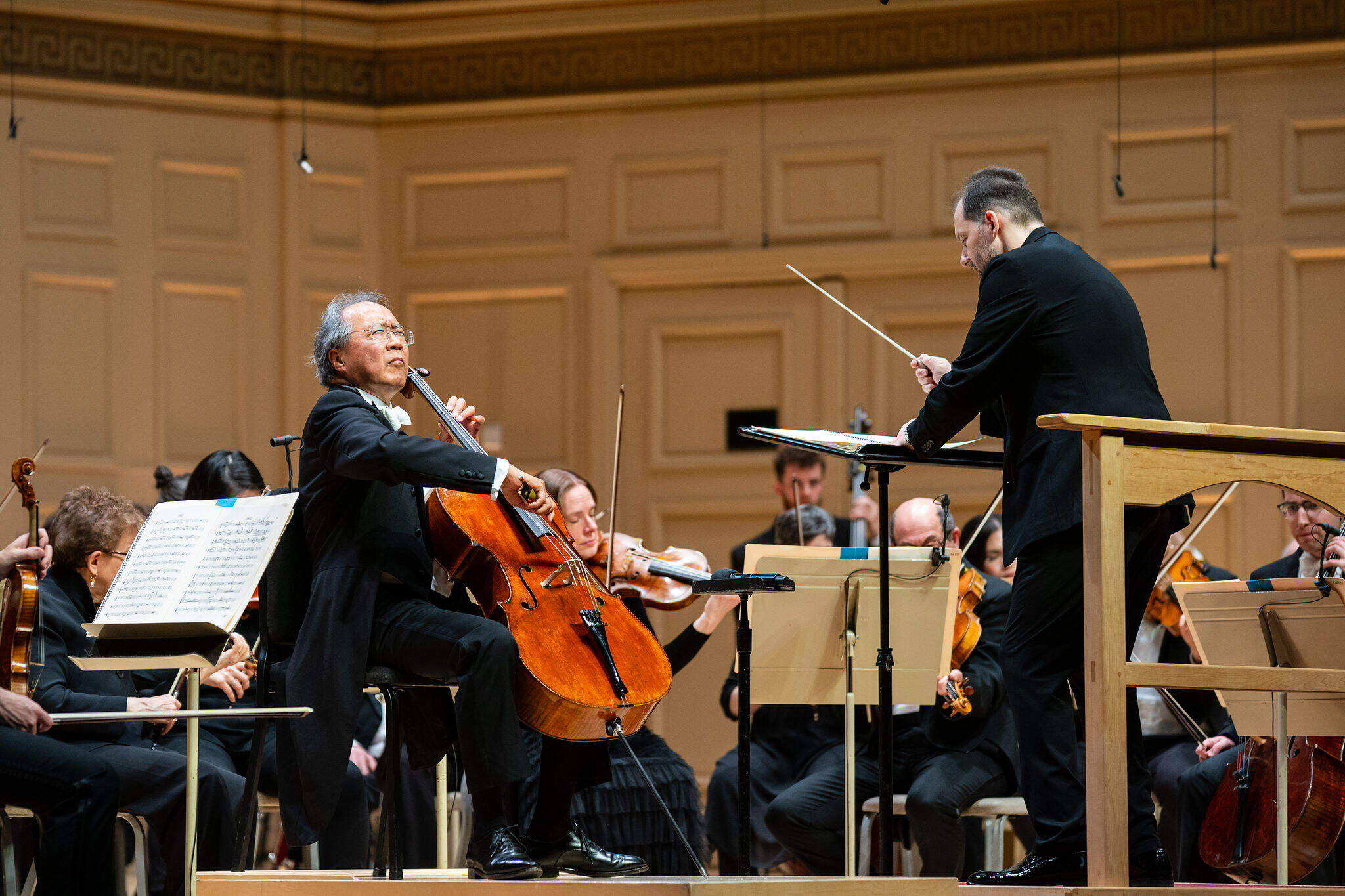Advertisement
REVIEW
The Nelsons and BSO Shostakovich box set contains multitudes, both musical and philosophical

When there’s a final reckoning of Andris Nelsons’ tenure as artistic head of the Boston Symphony Orchestra, his performances and recordings of Dmitri Shostakovich's music will certainly ride high on the list of his greatest hits.
Those recordings are now under one sturdy roof — the Deutsche Grammophon box set of the 15 symphonies as well as six concertos, incidental music and the opera “Lady Macbeth of the Mtsensk District.”
Nelsons has always been a finely-attuned accompanist and he has some pretty impressive company joining the band here — two concertos each with Yuja Wang on piano, Yo-Yo Ma on cello and Baiba Skride on violin. All three can go head to head with any of their predecessors. Matthias Goerne lends his tremendous bass-baritone to “Babi Yar,” Symphony No. 13 (one of the collection’s highlights) and Nelsons’ ex, Kristīne Opolais is a Lady Macbeth I wouldn’t want to mess around with. She’s also on hand for Symphony No. 14 with an impressive Alexander Tsymbalyuk.


That’s just part of the story. This is the most concentrated, fully committed, bold playing that I’ve heard from Nelsons — on the symphonies as well as the starry concertos and opera. One can prefer a Leonard Bernstein Seventh here or the recently released Bernard Haitink 15th there and others prefer the old Soviet conductors for their grit.
Nelsons’ set, on the other hand, is brightly recorded with one award-winning or highly lauded performance after another. I even enjoyed the second and third propagandistic symphonies. Such consistency and synchronicity with the orchestra have not always been hallmarks of Nelsons’ conducting, as witnessed by the thrown-together box set of Richard Strauss recordings that even Wang and Ma couldn’t save from head-scratching meh-ness. The Strauss performances, with both the BSO and his other group, the Gewandhausorchester Leipzig, were also collected in what might be the ugliest box set that Deutsche Grammophon, usually a pre-eminent packager, has ever produced.
Advertisement
No such problems here, although the lack of librettos and translations are a problem in almost all the Deutsche Grammophon and Sony box sets. (At least provide links or a QR code to that information.) These are packaging nits to pick and to the good, on that score, the symphonies have been rearranged from the unconvincing thematic packaging of the individual releases into a chronological survey.
The chronological approach helps us take a better measure of the artist. The political questions surrounding Shostakovich often revolve around whether he was too much in Stalin’s orbit, afraid to take him on until the dictator was dead. Or was he a sly subversive, turning — for example — the triumphalism of the Fifth Symphony into the crushing stomp of the Soviet tyrant.
Here are Nelsons and the BSO performing excerpts from the Fifth with the conductor talking about Shostakovich's duality:
The Latvian-born Nelsons is no friend to the Soviet era, though he proclaims to be more interested in Shosty’s musical values. Nelsons certainly does right by those values, but that’s not the most interesting aspect of these performances.
What emerges is a portrait of a man who, like Shakespeare, had to be eternally cognizant of losing his head while still creating a body of work that tells the story of his time and times to come. Shostakovich is not the revolutionary artist that Shakespeare was, but there are interesting parallels. Laurence Olivier could turn “Henry V” into a thrilling patriotic statement in the wake of WWII while Kenneth Branagh made it into a more anti-war statement.
Shostakovch, too, contains multitudes and contradictions. It’s not like defeating Hitler was, you know, a bad thing so celebrating Soviet victories in WWII is hardly to be condemned. At the same time those victories were giving rise to a man almost as monstrous as Hitler. That sensibility might not be present in the early symphonies, but the dualities are there throughout these works. Sometimes the nose-thumbing is more overt — the ninth symphony and the opera. Sometimes giving the Politburo what they wanted is paramount. Both artists had to reckon with head loss.
Shostakovich’s accessibility is often held against him, but Shakespeare wasn’t averse to playing to the masses either. Nelsons doesn’t at all give in to holding Shostakovich’s comparatively conservative musical language against him; indeed he plays the thrills for all they’re worth, as do his starry soloists and the BSO.
And what they’re worth is quite a bit. Nelsons is right — the music does speak for itself. But it also speaks to the plight of modern man. How much do we say what we think without being canceled by the Trump right or the identitarian left? Can we face the world’s woes without falling into despair?
That’s all in the music herein. And so is sharing a joke, political or personal, particularly in the ninth symphony. And so is putting the woes of the world aside and just enjoying the high spirits of being (and staying) alive, as in Wang’s joyride performances of the piano concertos.
You couldn’t make a much better case for Shostakovich as the musician, the man and the modernist as this set does. It’s quite an accomplishment for Nelsons and the BSO.
The symphonies, incidental music and the piano and cello concertos are also available on individual CDs. Baiba Skride's violin concertos and "Lady Macbeth of the Mtsensk District" are only available digitally and in the box set.
Skride will play the first violin concerto at Symphony Hall with the Boston Symphony Orchestra, who will also perform Symphony No. 8, on May 2 and 3 as part of the BSO' s "Decoding Shostakovich" series. The series also includes a discussion of "Judaism in the Soviet Union" at 6 p.m.. April 30 at the Vina Shul and "Form and Function: Brutalism i the Soviet Union" at 6 p.m. May 7 in the Boston City Hall lobby.


